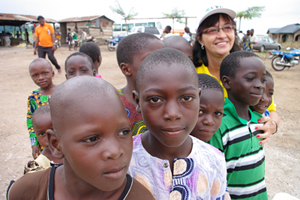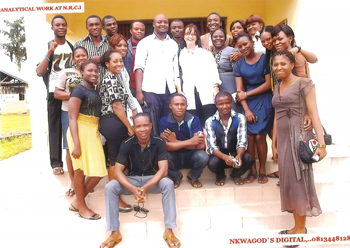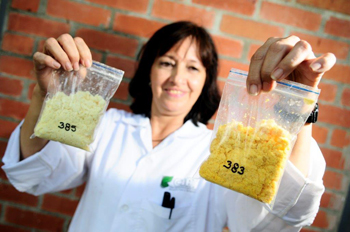Teresa Sánchez has trained many people in her lab, and she has gained a lot from it.
 While agricultural research is about progress and technology, it is also about people – the motivated and dedicated researchers whose work and collaboration make a world of difference for others. Teresa Sánchez, a research associate at the International Center for Tropical Agriculture (CIAT) is one of those people.
While agricultural research is about progress and technology, it is also about people – the motivated and dedicated researchers whose work and collaboration make a world of difference for others. Teresa Sánchez, a research associate at the International Center for Tropical Agriculture (CIAT) is one of those people.
With Nigerian children (photo: D. Dufour, CIAT)
I first met Teresa Sánchez when we both were in Nigeria. She was coming back from a cassava processing plant and looking forward to meeting with young Nigerian researchers who she had trained years earlier. A chemist specializing in food crops, Sánchez has been working at CIAT for the past 33 years and has accumulated a wealth of knowledge on cassava analysis during that time. From cyanide content to postharvest deterioration, she and her colleagues in the quality control lab test cassava for an array of traits that help CIAT breeders to select varieties and respond to the needs of small farmers, consumers and industry.
But Teresa Sánchez is no lab nerd. She is first and foremost a people person. For her lab also serves as a training center for many young researchers from developing countries who are eager to learn about quality-control methods and techniques. Undergraduates, postgraduates and PhD students from Colombia and other countries have joined her team over the years to learn how to do an array of analyses.
 “Lately, we’ve welcomed students from Africa, in particular Nigeria, who are interested in the methodology for nutritional quality assessment,” Sánchez said, adding that those students return to their countries to apply the skills and knowledge they’ve acquired.
“Lately, we’ve welcomed students from Africa, in particular Nigeria, who are interested in the methodology for nutritional quality assessment,” Sánchez said, adding that those students return to their countries to apply the skills and knowledge they’ve acquired.
“CIAT offered me the opportunity to learn and to do my PhD dissertation in carotenoid profiles, antioxidant content and antioxidant capacity, and I worked with Teresa Sánchez on starch characterization,” explained Ukom Anthony Nwanko, who spent five months at CIAT last year. He is currently Chief Technologist at the Department of Food Science and Technology at Abia State University in Nigeria, where he teaches students in his laboratory. “I have a fond memory of the researchers who helped me with my dissertation analysis, including Teresa,” he wrote.
Etudaiye Hussein Adinoyi spent six months at CIAT in 2010. He is now a Principal Research Officer at the National Root Crops Research Institute (NRCRI) in Umudike, Nigeria. “While working under the supervision of Theresa Sánchez, we received about 93 cassava varieties of 3 replications from northern Colombia for some root quality traits analyses such as qualitative and quantitative evaluation of cyanide, dry matter and starch contents, and the detection of varieties that are tolerant to Post-Harvest Physiological Deterioration when stored for different periods,” he explained. “I was trained on ethanol production and quality from cassava starch using a novo starch hydrolyzing enzyme called STARGEN 001. We studied the yields and qualities of ethanol produced from normal starch and waxy cassava starch, and the effects of root thickness, root diameter and root length on starch yield processed from the cassava varieties.“ When I visited Teresa Sánchez in her lab recently, I could tell that she and the small team she works with were thrilled with the recent renovations made to the lab with RTB support.
“We’re even more motivated now that we’re working in freshly-painted installations with state-of-the-art equipment,” she observed, adding that RTB encourages more exchanges between centers and a wider range of research. Though 70% of the tests performed in her lab are on cassava, the remainder is on other RTB crops. “I believe that the RTB is helping to design a vision for the future,” she said.
Sánchez explained that she works closely with CIAT cassava breeder Hernán Ceballos and food technologist Dominique Dufour: “I send them my results, and I benefit from their knowledge – we’re a good team,” she said with a smile. A milestone of that collaboration was their 2006 discovery of a new cassava variety called “waxy cassava,” which has turned out to be very important for the starch industry.
“I truly love my job – but I also meet friends through my job, and that’s the best part!” Sánchez told me. “I believe it’s Mother Teresa who once said: ‘One doesn’t need money, one needs friends’.”
By Véronique Durroux-Malpartida

